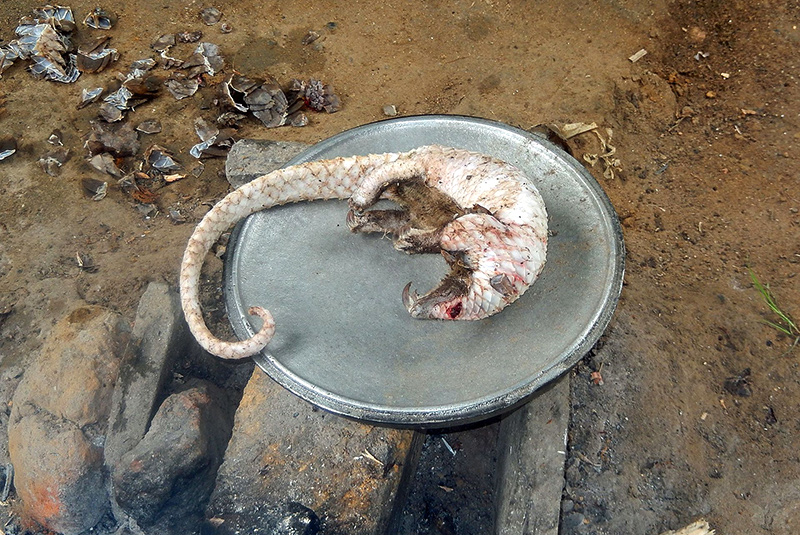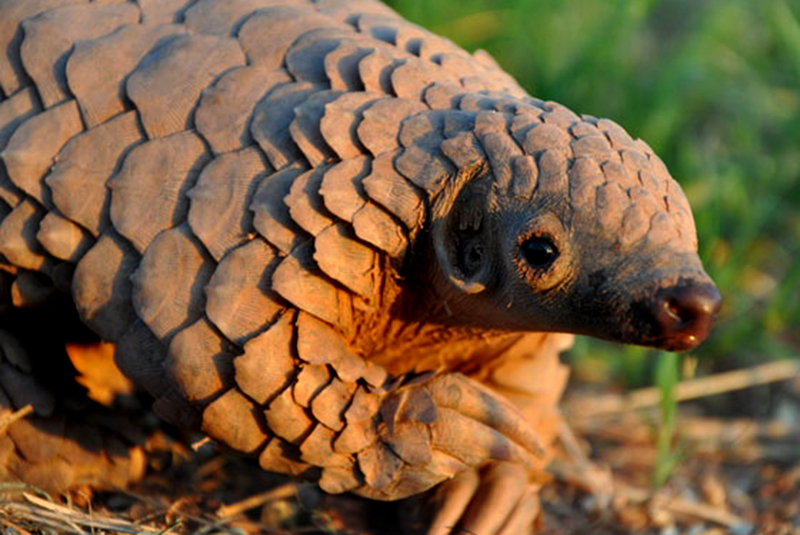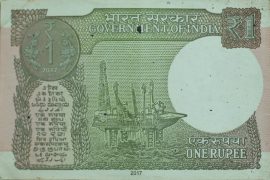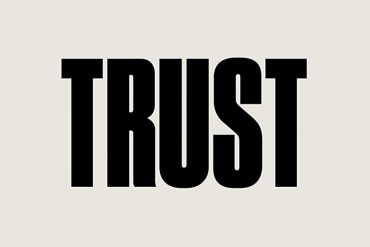Captured pangolins are teased, used as props for amusement, and even killed and skinned to film the process of removing scales from the body in horrific videos. The perpetrators performed ‘tricks’ such as the ‘electricity test,’ in which the animal is jabbed with a metal screwdriver linked to a bulb, which lights up, and the ‘bubbles test,’ in which the scales allegedly produce bubbles when dipped in water — all fabricated tactics to attract buyers and raise prices.
A report by the Print in May this year unveiled YouTube channels with hundreds of followers as breeding grounds for the illicit trafficking of pangolins. Pangolins are one of the world’s most trafficked species, and Indian law protects them in the same way as tigers, lions, and rhinos do. Therefore, if someone is found in the smuggling business of pangolins, they are heavily penalised. The Print reported that smugglers from Maharashtra’s Alibaug, Odisha’s Mayurbhanj, and West Bengal’s Jalpaiguri were arrested for the crime.
The illicit wildlife trade is the world’s fourth-largest criminal business, with an annual profit of more than $7 billion. Every year, tens of thousands of pangolins are poached for their scales, which are used in traditional Chinese medicine, and for their flesh, which is considered a delicacy by many of China’s and Vietnam’s incredibly rich people who are willing to pay high prices for the trade.

Pangolins are classified into eight species. The IUCN lists four pangolin species located in Asia as critically endangered: Chinese, Sunda, Indian, and Philippine pangolins. The Chinese Pangolins (Manis pentadactyla) is endemic to the northern Indian subcontinent in the Himalayan foothills, northern portions of Southeast Asia, and southern China. The IUCN Red List listed the mammal as critically endangered in 2014, as the wild pangolin population is believed to have fallen by more than 80% in three pangolin generations, or 21 years.
Last year, Pangolins were in the news as they were linked carriers of a novel coronavirus. China prohibited the eating of its flesh and the selling of its scales, thereby protecting the animal. However, the dread of Covid was unable to keep Asia’s illicit wildlife trade away from it.
Pangolin scales are composed of keratin, which is also found in fingernails, hair, and horn. Pangolin scales, like rhino horn, are utilised in traditional Chinese medicine to treat illnesses; however, their medical value has not been proven. The scales are usually dried and crushed into powder, which is then formed into a tablet.
This species is mentioned in both Chinese and Vietnamese traditional medical literature, where scales are used to cure skin problems, increase blood circulation, and promote milk production in nursing mothers. Pangolin scales seem to be recommended for these and other illnesses, as well as cancer, in China.
For long years, poachers and traffickers focused on Asian species. Even though their numbers have since been reduced, the Print revealed continuous illegal trade through India and the brutal treatment of the near extinction creature. They discovered 19 active YouTube channels with over 18 lakh views that posted 30 films of living pangolins and 20 videos of pangolin scales.
With rare exceptions, there is relatively little information accessible on population numbers at any level, local, national, or global, and there is a scarcity of study on abundance. This species is seldom seen, owing mainly to its growing scarcity, but also its secrecy, solitary nature, and nocturnal habits.
Between 2000 and 2013, it was projected that international trafficking of this species included 50,000 individuals. Therefore, the 186 nations that are parties to the Convention on International Commerce in Endangered Species (CITES), the convention that governs international wildlife trading, voted in 2016 to prohibit commercial trade in pangolins. However, the numbers kept increasing as the IUCN Red List calculated the total numbers between 2000-2018.
Since 2009, the Chinese government has released an average of 26.6 tonnes of pangolin scales from (probably) official stockpiles into the country’s legitimate scale marketplace, which is verified via a certification mechanism. This system, however, is weakened by continuing illicit trading and the accessibility of scales in traditional medicine stores. In Vietnam, there is ongoing but illegal availability.
The Print research states that the wildlife trade has evolved with the digital age of fast networking. Buyers and traffickers are utilising social media platforms to communicate with one another and arrange agreements. YouTube is quickly becoming a hotspot for illicit wildlife trafficking. The endangered pangolin confronts the prospect of widespread internet trafficking, which is exacerbated by its growing popularity on the video-streaming site, where it is about to be publicly auctioned.
The YouTube comment section acts as a hunting field for buyers, dealers, and intermediaries. The strategy is to seek buyers/sellers by declaring availability or interest in wildlife items, exchange contact information, and then continue talking privately to finalise transactions.
Traders do not only utilise YouTube. According to a Mongabay article from April of this year, messaging apps like WhatsApp, as well as social media sites like Facebook and Instagram, were used to contact consumers and negotiate trade logistics.
Between 2017 and 2019, the number of pangolin scales confiscated by law enforcement agencies worldwide tripled. The Deputy Conservator of Forests revealed in a statement to Free Press Journal last year that 164 suspects had been detained in India from 12 states after a covert operation that resulted in the arrest of people selling pangolins on YouTube last June.
Despite being protected under Schedule I of the Wildlife (Protection) Act of 1972, Indian and Chinese pangolins are extensively hunted and sold for flesh and scales throughout India. The unusually scaled animal, the only known mammal to exist as such, has earned the unenviable distinction of being one of the most abused and trafficked mammal.
Social media companies need to take responsibility for facilitating such illicit trade. By deploying sophisticated technologies to identify illicit trade of species, they could help[ reduce illegal trafficking of endangered species. Tech companies must also alert authorities about people engaing in illicit trading and slaughter of endangered animals. More importantly, they must delete films or channels that encourage such trade.
-30-
Copyright©Madras Courier, All Rights Reserved. You may share using our article tools. Please don't cut articles from madrascourier.com and redistribute by email, post to the web, mobile phone or social media.Please send in your feed back and comments to [email protected]











